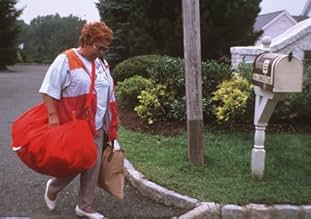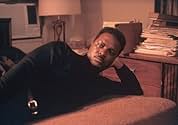Adicionar um enredo no seu idiomaCollege and high school serve as the backdrop for two stories about dysfunction and personal turmoil.College and high school serve as the backdrop for two stories about dysfunction and personal turmoil.College and high school serve as the backdrop for two stories about dysfunction and personal turmoil.
- Prêmios
- 1 indicação no total
- Ethan (segment "Fiction")
- (as Steven Rosen)
Avaliações em destaque
The film has two parts. The first part, titled Fiction, focuses on a creative writing student Vi (Selma Blair), her Cerebral Palsy-stricken boyfriend Marcus (Leo Fitzpatrick) and their professor Mr. Scott (Robert Wisdom).
The classroom setting provides an unusual venue: a story writing workshop within a story. Solondz puts one of the characters through a perversely traumatic experience, which we witness as viewers of the movie. Before we have a chance to pass judgment on Solondz, his character writes about the event in the 3rd person and reads the story in class. All accusations one might level against Solondz (namely: bad taste, plus every "ism" in the book) get made by the fellow students, who detest the story. But in the context of the movie, they're condemning an account of an event that actually happened! Very clever...
In spite of some of the grotesque twists, I found myself laughing out loud fairly often. Solondz has a gift for rendering subtle ironies that become overwhelmingly funny.
The lead characters are fascinating and multi-layered. Vi seems innocent, but if you pay close attention, you'll notice she's not particularly sincere. One would like to root for Marcus, but his condition doesn't excuse him for being a lousy writer and a self-absorbed a**hole. The professor may be a monster, but he is also very frank.
The second part Nonfiction is also highly self-aware. It covers the making of a two-bit documentary. In the process, the dialog once again anticipates many of the charges some will make against Solondz (that he exploits his subjects and creates a sensational freak show for us to snicker at). There's a cameo role with Mike Schank, who was featured in real life in American Movie. The similarities between the documentary American Movie, the fiction Storytelling and the documentary within a fiction (tentatively titled American Scooby) are uncanny.
Scooby (Mark Weber) is the ultimate apathetic suburban slacker teen. While very much spoiled and sheltered, he is also alienated from, and resentful of, his elders. He perks up a bit when there are no grownups around, but most of the time the "stupid" barrier is up and his eyes are half-closed and red from smoking pot. He's such a lost cause, he attracts the attention of an aspiring documentarian (Paul Giamatti).
As you might expect, the rest of Scooby's family is a real piece of work. Scooby's dad (John Goodman) is loud and domineering. His mom (Julie Hagerty) is idiotic. His younger brother Brady (Noah Fleiss) is a jock, perhaps the closest to what we'd like to consider "normal".
The brainy youngest brother, Mikey (Jonathan Osser) is a real standout. He tags around with the overworked El Salvadorian housemaid Consuelo (Lupe Ontiveros) and asks her lots of questions. His curiosity is cute, but his conceited insensitivity truly boggles the mind.
Solondz definitely favors the sordid, but I'm not sure he does so gratuitously. I think he simply refuses to pretend, as so many other do, that the world is a tidy, simple place. (Those who seek to preserve such a notion are guaranteed to abhor his work.) But is it fair to berate Solondz just because he dares to present what others systematically avoid? Whose vision is more skewed: Solondz for pointing out the dog***t on our shoes, or the mainstream for ignoring it?
I wish I could agree that his writings are contrived and distorted, but I don't think they are. Through the media, through the grapevine and sometimes with my own eyes, I've seen events that are every bit as twisted and "wrong" as those Solondz creates. Everywhere I look, I encounter people who could easily be incorporated into a Solondz script.
Every storyteller recreates the world according to his/her own vision. Todd Solondz just happens to be vastly more perceptive and talented than most. Storytelling is one of the most insightful, clever and thought-provoking films I've ever seen. Watch it multiple times for maximum yield.
Sadly though, I find it hard to convince certain TYPES of people as to why Solondz's work is so good. I try to tell them the writing is award-winning and beyond most failed attempts at culture critique. I try and tell them how good the performances are. I even try and point out some fantastic themes out of the multitude available in his work. But these certain types, they just can't seem to get it.
But on the bright side, the one thing that does give me a boast about Storytelling is Conan O'Brien. Now, it's not the fact that he's here, but how he fits in, it's like there are people out there that do NOT understand Conan or his humor at all, they just don't get HIM altogether. Then there are those, such as myself, that completely understand Conan and all his self-deprecation. How can you not love a character like Scooby that wants to be Conan's sidekick??? Is this NOT the dream of every self-deprecating teenager and college student?!? Being able to simple make that point in a film, as Solondz does so perfectly during that scene with Scooby and Conan, right after the proverbial gay pseudo blow-job, is something most auteur's can't ever GET AT. This is why it's depressing watching the film, you see how brilliant this man is and how clearly he can speak his mind and say to you: "I hear YOU, I feel this way, and I know you do too, and this is here for US to enjoy, not just something for everyone." Some people say Art is something everyone can universally appreciate. Others say it is completely subjective. I think it can in fact be both ways. You can look at Storytelling or actually Happiness is better for this as formulaic, or formal art, the technical way the film is put together is brilliant, that's its universal art. The thematics, the way the auteur says what's directly on his mind in a way that a certain kind of person is immediately able to grasp a hold of firmly, that's the other kind, the subjective kind. This man understands communication, let alone life, like very very VERY few writers and directors ever have and ever will.
This is a rare film, because it's a film maker addressing his critiques, himself, and his audience all at once. And it has plenty of Solondz trade mark cringe scenes, that veer drastically from comic to dramatic in a matter of breaths. The results are absorbing but like all Solondz it leaves a bad taste in your mouth, and makes you honestly question your own moral compass. They say satire is dead if the audience cannot be shocked, but it's also dead if the audience cannot be shamed, in the days where South Park and Family Guy, are on non cable TV any afternoon (l love both shows), shock and shame are concepts so familiar they've lost some of their power. Thankfully just when we've seen it all and were sure that nothing matters and nothing can surprise, startle, or offend us, Todd Solondz will be there to show things can always get worse.
Você sabia?
- CuriosidadesThere was a third story, with James Van Der Beek as a college student realizing his sexuality, which was subsequently cut out of the film.
- Erros de gravaçãoThe positions of Scooby's hands when he is holding the gun change between shots.
- Citações
Catherine: It was confessional, yet dishonest. Jane pretends to be horrified by the sexuality that she in fact fetishizes. She subsumes herself to the myth of black male potency, but then doesn't follow through. She thinks she 'respects Afro-Americans,' she thinks they're 'cool,' 'exotic,' what a notch he 'd make in her belt, but, of course, it all comes down to mandingo cliché, and he calls her on it. In classic racist tradition she demonizes, then runs for cover. But then, how could she behave otherwise? She's just a spoiled suburban white girl with a Benneton rainbow complex. It's just my opinion, and what do I know... but I think it's a callow piece of writing.
- Versões alternativasThe original version of the film featured a third story entitled "Autobiography", concerning, among other things, a closeted football player (James van der Beek). The main character has an explicit gay sex scene with a male partner (Steven Rosen); the entire story was cut from the final version.
- ConexõesFeatured in Este Filme Ainda Não Foi Classificado (2006)
- Trilhas sonorasFiction
Performed by Nathan Larson and Nina Persson
Written by Nathan Larson and Nina Persson
Published by The Music Of NATO and Stockholm Songs
Nathan Larson appears courtesy of Artemis Records
Nina Persson appears courtesy of Stockholm Records
Principais escolhas
Detalhes
- Data de lançamento
- País de origem
- Central de atendimento oficial
- Idiomas
- Também conhecido como
- Storytelling: Historias de ironía y perversión
- Locações de filme
- Empresas de produção
- Consulte mais créditos da empresa na IMDbPro
Bilheteria
- Faturamento bruto nos EUA e Canadá
- US$ 921.445
- Fim de semana de estreia nos EUA e Canadá
- US$ 73.688
- 27 de jan. de 2002
- Faturamento bruto mundial
- US$ 1.318.945
- Tempo de duração
- 1 h 27 min(87 min)
- Cor
- Mixagem de som









































